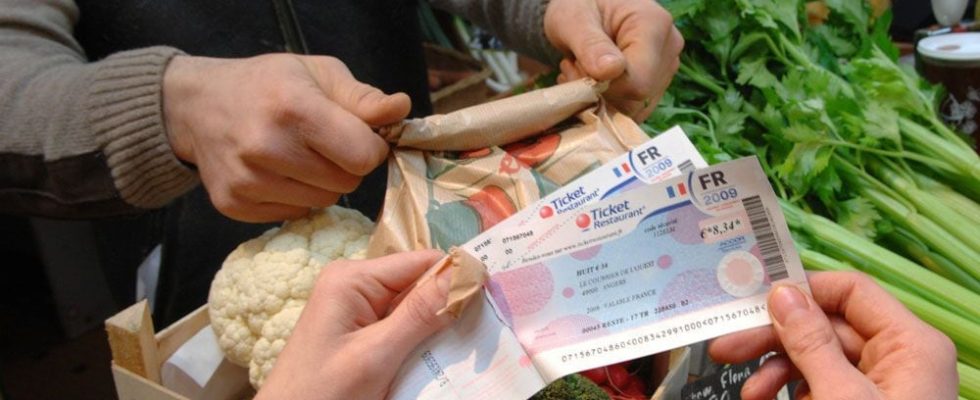“With its about-face on the extension of the use of meal vouchers for food products, the government is sending a very bad signal to our profession,” lamented recently the starred chef Thierry Marx, president of the main employers’ union of the ‘hotel and catering. “In restaurant voucher, there is ‘restaurant’. […] It must not become a shopping cart voucher,” he added. Introduced during a period of inflation but on a temporary basis, the possibility of purchasing food products that are not directly consumable in supermarkets, with meal vouchers, should end in December 2023. The continuation of this measure in 2024, announced this week by the government, is therefore not to the taste of restaurateurs.
Welcome to France, this country where the most microscopic matters arise in an instant, as the intermediary bodies are weak or non-existent, at the highest level of the State. For the record, during a local meeting of the “great debate” organized by Emmanuel Macron at the time of the yellow vest crisis, one of the people in the audience complained to the President of the Republic… that the The use of meal vouchers, again, was too restricted. So many reactions symptomatic of the network of mutual dependencies which link, in France, the State, businesses and individuals.
Meal vouchers were designed to offset the cost of a meal taken outside for employees who do not have a company restaurant. Heirs, in full rationing, of meal vouchers introduced by the Vichy government and meal vouchers (luncheon vouchers) launched in the United Kingdom in 1946, then the “meal credit” invented in 1962 by the restaurateur Jacques Borel, meal vouchers are, today, financed jointly by the company and the employee and exempt from social security contributions and taxes (if the employer’s contribution is between 50% and 60% of the value of the security).
A complex and shaky device
Originally, these checks were intended as much to encourage the consumption of a balanced diet as to support catering, a French institution if ever there was one. We can also see it, within the company, as an egalitarian measure since a CEO receives as many meal vouchers, and the same amount, as the most modest employee. After all, we only have one stomach, and nutritional needs are roughly speaking the same for everyone.
But in doing so, the State has created a complex, restrictive and difficult system to undo (one more). The employee, first of all, finds himself subjected to the double paternalism of the State and the company, ordered to spend a sum that he could otherwise use for limited food expenses. Furthermore, while catering prices are high, working rhythms have evolved considerably, teleworking has become established over the long term and eating habits have become more diversified and individualized, this direction seems all the more outdated. The employer, for his part, finds himself dependent on a State which could, if it wanted, revise its exemptions downwards. As for the State, by making itself the big canteen, it finds itself the main recipient of everyone’s demands, which overwhelm and exhaust it.
For all these reasons, it would be much simpler and liberal in the literal sense if these titles were removed and the employer paid the employee their amount in the form of… salary. But if this does not happen, it is because everyone is benefiting from this shaky system. The State attracts the good graces of restaurateurs and distributors, holds the companies in its hand thanks to reductions in charges and extends its tentacles “biopolitics“, to use Michel Foucault’s neologism, on individuals. The employer, given that benefits in kind are often psychologically perceived as singular and therefore valuable, buys social peace with a gift that is not one, is exempted from a more meritocratic salary policy and avoids a painful confrontation with the State to reduce costs. The employee, for his part, perceives the title as an addition to his remuneration which differentiates him from other workers. Everyone depends on everyone, everyone regrets it and everyone is happy about it.
This case would be anecdotal and even comical if it were not a sort of small-scale representation of the French social state. Instead of aiming for the lowest possible compulsory deductions, we prefer a generous State which increases expenditure through multiple “checks” or even which, without directing them, gives back with one hand what it took with the other . Many households today find themselves paying heavy taxes and at the same time receiving assistance, for example for childcare, even though they could receive nothing while being less taxed. .
It is not difficult to understand that if the State only paid individuals the net sum from which they benefit, if applicable, the result would be painless for individuals, but would involve an administration reduced to a bare minimum. To persevere in its existence, the administration must therefore become plethoric, a hub for the highest possible levies and expenses. Incidentally, not only does it not create any value but it takes value from others. It is an understatement to say that this big machine does not only act in the interest of citizens but also of itself. Nietzsche, without having the good fortune to benefit from meal vouchers, had understood this well. “The State is the coldest of cold monsters,” he wrote. “It lies coldly; and here is the lie that escapes from its mouth: “I, the State, am the people.”
.
